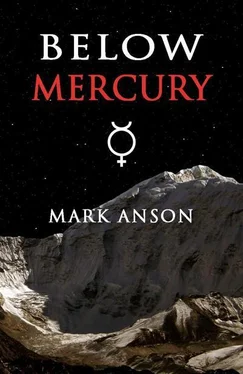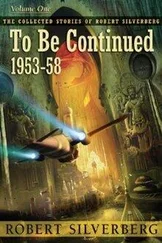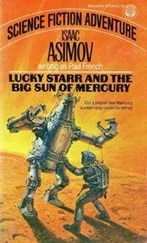Despite her better judgement, she felt herself warming to Matt, and she risked a glance back at him when she was sure his attention was elsewhere. He looked tired after the long day, she thought, tired but happy.
Perhaps she was starting to understand why.
Later, and it was silent in Matt’s apartment on the base. Bergman and Matt had come back here after the meal, and they had stayed up talking for a while.
Bergman was sitting in an armchair, drinking coffee; Matt was laid back on the couch. Matt’s mug of coffee lay untouched on the table beside him. It had been a long time since anyone had spoken.
Bergman yawned, and glanced at his watch.
‘Well, my friend, I need to get back to my place.’ He stood up, and saw that Matt had fallen asleep where he lay.
Bergman found his jacket, and went to the door to go.
There was a pile of framed pictures on the hallway table. Evidently Matt was still in the process of unpacking. Bergman picked one up. A photograph of a younger Matt holding a roll of parchment, standing next to his parents, who were trying not to look too proud. An old building in red brick and stone was behind them.
Another one. A photograph of Matt holding a surveyor’s staff to the roof, in some dark underground passage. The flash was reflected in pools of inky black water. It wasn’t possible to tell if the mine was on Earth, or on one of the planetary mines.
Another photograph.
Matt in a spacesuit, grinning behind the faceplate, as he stood on the top step of some aluminium stairs, poised to enter the body of some landing craft. It looked like it was from one of Matt’s early assignments.
Another picture, and this one was grainier and poorer quality than the rest. It appeared to be a shot of a smooth, rectangular area set in a rough rock wall, but as Bergman peered closer, he saw that it was a set of gigantic pressure doors; there were some spacesuited figures at the base that revealed the true scale of the scene.
Bergman peered closer to read the lettering on the doors, and realised that he was looking at the main portal of Erebus Mine, on Mercury. He couldn’t tell if Matt was one of the spacesuited figures in front of the doors, or the person taking the photograph.
Bergman stared at the picture a long time, and then replaced it carefully on the table, before letting himself out into the cool night air.
Picture: Olympus-240 spaceplane
May 4, 2151, and the rain fell from a grey morning sky over Andersen Base.
Drifting across the northern part of the island in great sheets, the clouds released their rain in a long, slow deluge that brought visibility down to a few hundred metres. It fell across the kilometres of grey concrete runways, the parking aprons and taxiways, collecting in great pools as it swirled down into the mouths of the overloaded storm drains.
Heavy rain was unusual for Guam in early May, but a distant typhoon out over the ocean had flung a belt of storms across Guam and the long curve of the Mariana Islands. Distant thunder still boomed over the mountains to the southwest, but the high winds and thunderstorms of the previous night were moving on now, trailing a band of rain behind them to drench the island.
It was three months after their initial meeting of the mission team, and if all went well, today would be the day they set off on their long journey to Mercury. The time between had been a continuous round of classroom lectures, training, simulations, physical fitness programmes and rigorous planning, so that every member of the team knew what they had to do to ensure the success of the mission.
They had flown in fast jets to experience the effects of high g-forces during the orbital ascent, practised parachute landings for an emergency ejection, even what they had to do if the spaceplane ditched over water. While nothing could ever be like the real thing, the mission team felt well prepared for the challenges that lay ahead.
In just a few short hours, the launch window would open for the space tug to set off on its long journey to Mercury. High above them, hundreds of kilometres above the clouds and weather of the Earth, the tug circled in its orbit, fully fuelled, waiting for the six-man mission team. Yet here they were, sat on the ground waiting for the weather to clear.
The spaceplane with the mission team aboard stood in a fuelling apron at the end of a taxiway, off to one side of the immense runways. A liquid oxygen tanker stood close by the left side of the spaceplane, cold white vapour swirling from its fuelling hoses as it completed the initial fill. On the other side, by the open cargo bay door, a supply truck had just finished loading the last of the stores. A ground handler swung the heavy cargo door shut and closed the locking handle, as the truck started up. It pulled away, leaving two wide tracks behind it in the surface water; they disappeared swiftly in the falling rain.
The ground handler ran his hand over the edges of the cargo bay door, checking that he had latched it securely. He lifted his head to the rain, and the graceful shape of the spaceplane above him.
Nearly 36 metres from its nose to the rearmost edges of its twin tailfins, the Olympus spaceplane was a beautiful craft. Its white heat-resistant paint gave it the appearance of some exotic seabird, wings outstretched, waiting to leap through the rain clouds and soar into the sky.
The long, streamlined fuselage was set into a swept-back delta wing, over 22 metres across its downturned wingtips. Under the wings, in two large, podded nacelles, the four main engines lay at rest, with just a wisp of white vapour trickling from their enormous exhaust nozzles. Together, the engines provided up to two million newtons of thrust; enough to hurl the spaceplane out of the clutches of Earth, or any of the inner planets.
Brought back from Mars in January, the spaceplane had spent the last few months in Andersen’s maintenance hangars. As well as a thorough overhaul of its airframe and engines, it had been converted specially for its mission to Mercury. The landing gear, red with iron oxide dust from countless landings on Mars, had been replaced with strengthened units to cope with the higher landing weight. An improved night vision system had also been fitted, to assist them finding the landing site in the darkness of the crater.
In the crew compartment at the front of the craft, the two unoccupied ejection seats at the rear of the cabin had been removed to save weight and provide more stowage space. Behind the crew compartment, the cargo hold was crammed with equipment for the mission: food, clothing, spacesuits, drilling equipment, tools, sealed canisters of blasting explosives, roof supports, medical supplies, portable radios with folding antennas, and a lightweight, battery-powered trolley for carrying it all.
Two large bundles held the inflatable habitat modules that the mission team would use as their living quarters while they were on the surface. Pressurised and heated by umbilicals from the spaceplane, these would unfold and inflate into two self-contained living spaces, complete with a surface airlock and flexible room dividers.
The rest of the fuselage – nearly 24 metres of it – was taken up by the two huge tanks for the liquid oxygen and liquid propane fuel. The spaceplane could not take off with its full fuel load; it was too dangerous in case of a rejected takeoff, and the landing gear was not designed to take the weight. Instead, it took off partly fuelled, and completed the bulk of its fuelling in mid-air over the Pacific Ocean.
The spaceplane’s structure groaned and creaked as it adjusted to the weight of fuel and liquid oxygen. The insulated cryogenic tanks gave out faint, high-pitched shrieks as the super-cold liquids chilled the metal walls down to their operating temperature.
Читать дальше











